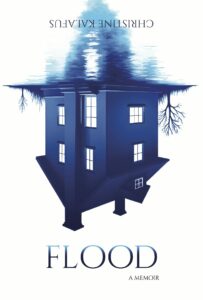 Review by Emily Webber
Review by Emily Webber
When reading Flood, Christine Kalafus’s debut memoir, there’s a constant feeling of being pulled by raging waters, swept up into something you can’t control, the feeling of waters rising and rising, and you can’t do anything to stop it. There’s a good reason for this. Kalafus, in the immediacy of the present tense, is describing both literal and metaphorical floods.
The moon is wide, red, and does not help me. When I collide with knotted roots and rocks, I slip, silent. I could stop, talk to the factory workers. Take my chances. I’m a blue-collar daughter.
The trees know better. They say don’t stop running. The flood is coming. They’ll take your elbows, kneecaps, and heart and give them to others. Or eat them.
I will be a trunk. Of no use. I outrun my breath and wake to the twins’ cries.
Stupid trees. You can’t outrun a flood.
In the house that Kalafus buys with her husband, the one that neighborhood children call the Witch House because of its unique construction, a natural spring underneath floods the house. She also relays her parents’ experiences during the historic flood of 1955 in Connecticut. Then there’s the flood of emotional trauma. Kalafus learned that her husband had an affair with his co-worker. Even more distressing, she’s the mother of a toddler and pregnant with twins when she finds out she has breast cancer.
Kalafus’s father recalls during the 1955 flood seeing “an entire barn float down the Naugatuck River, slamming into a bridge, the barn splintering like brittle bones.” It’s an image that represents what Kalafus is enduring through this memoir, where it seems every part of her life is breaking into pieces at once.
Kalafus’s choice to use the present tense gives frenzied energy to her story. The reader can feel the weight of all she is dealing with—the devastating effects of her husband’s affair and the exhaustion, combined with the bodily horrors of cancer treatment.
I don’t have the safety of distance to assess my loss. I worry about surviving and when I am not worried about surviving, I worry about how not surviving will affect my children. I worry that I am not doing survival properly in this flood with no forecast of stopping. I close my eyes when I drive past graveyards—which seem to be sprouting up everywhere—a practice I would tell anyone else is a surefire way to end up in one. There is no way to ignore that I am drowning.
I never allow myself to say the word death.
It’s hard for Kalafus not to be entirely swallowed up by the multiple tragedies happening to her, especially while focusing on two newborns and a toddler. Her parents talk about a man who escaped the 1955 Connecticut flooding by climbing out a window of his house, but his wife could not escape and died. From then on, no one called him by his name, only referring to him as “the man who lost his life in the flood.”
Kalafus’s interactions with the medical community during her cancer journey serve as an important warning. Women must be their own advocate and not allow themselves to be dismissed by doctors. Even in the smallest ways, Kalafus recognizes she is fighting for her survival and for a life with her children, and she begins to use her voice.
“Where’s Kathleen?” I wipe my cheek with the back of my right hand.
“Kathleen is visiting her daughter. This would be easier with a port,” she says, like I told you so, even though I’ve never clapped eyes on her before. If anyone had told me that chemo shaming is a thing, I would have said they were insane.
“For you, not me,” I say, cradling my arm, closing my eyes. “I would like someone else please.”
I feel her staring at me, but I can win the stubborn Olympics. Usually, I take the gold. She gathers her caddy. I’m on the podium, waving to the cheering crowd.
In this finding of her voice, including the examination of what she wants versus what she has been taught to accept, both for her cancer journey, for herself, and how to repair her relationship with her husband, is where a more solid foundation emerges. Kalafus may not be able to outrun the floods, but she learns how to be resilient in the face of them, building a stronger house from the shattered pieces.
Flood by Christine Kalafus
Woodhall Press June 01, 2025
Paper,256 pages
9781960456311
Emily Webber is a reader of all the things hiding out in South Florida with her husband and son. A writer of criticism, fiction, and nonfiction, her work has appeared in The Rumpus, the Ploughshares Blog, The Writer, Five Points, Necessary Fiction, and elsewhere. She’s the author of a chapbook of flash fiction, Macerated. Read more at emilyannwebber.com.
